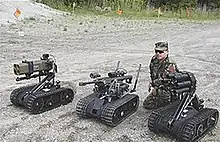American robotics
Robots of the United States include simple household robots such as Roomba to sophisticated autonomous aircraft such as the MQ-9 Reaper that cost 18 million dollars per unit.[1][2] The first industrial robot, robot company, and exoskeletons as well as the first dynamically balancing, organic, and nanoscale robots originate from the United States.[3][4][5][6]
History
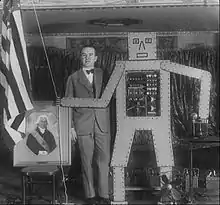
In 1898 Nikola Tesla publicly demonstrated a radio-controlled torpedo.[7] Based on patents for "teleautomation", Tesla hoped to develop it into a weapon system for the US Navy.[8][9]
In 1926, Westinghouse Electric Corporation created Televox, the first robot put to useful work. In the 1930s, they created a humanoid robot known as Elektro for exhibition purposes, including the 1939 and 1940 World's Fairs.[10][11]
Unimate was the first industrial robot,[3] which worked on a General Motors assembly line in New Jersey in 1961.[12][13] It was created by George Devol in the 1950s using his original patents. Devol, together with Joseph F. Engelberger started Unimation, the world's first robot manufacturing company.[4]
In 2008 the U.S. Air Force 174th Fighter Wing transitioned from F-16 piloted planes to MQ-9 Reaper drones, which are capable remote controlled or autonomous flight, becoming the first all-robot attack squadron.[2][14][15]
Modern robots
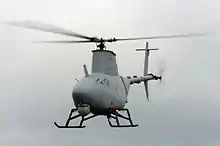
Domestic
- PatrolBot a configurable guide/delivery/surveillance robot
- Roomba a vacuum cleaner
- Scooba a floor washer
- Looj a rain gutter cleaner
Entertainment
Extraterrestrial
- ATHLETE lunar rover
- Mars Exploration Rover
Medical
Military (offensive/multi-role)
Aerial
- MQ-8 Fire Scout
- MQ-9 Reaper
Aerial
- RQ-4 Global Hawk
- RQ-7 Shadow
- RQ-14 Dragon Eye
Terrestrial
Nanoscale
Walker
- BigDog dynamically balancing quadruped
- Anybots Dexter, the first dynamically balancing biped [16]
- Timberjack Walking Machine logger
Non-autonomous (human operated)
These machines are human operated and not autonomous. Therefore, they do fit the classical description of a robot.
Exoskeleton
Military
Research
- Tufts University morphing chemical robot Tufts to develop morphing 'chemical robots'
Software
- Microsoft Robotics Studio - .NET based
- VxWorks - operating system, notably used by ASIMO
- Robot App Store - Apps for every robot
American robotics companies
- Anybots
- Barrett Technology
- Bluefin Robotics
- Boston Dynamics
- Brooks Automation
- Energid Technologies
- Evolution Robotics
- Foster-Miller
- Harvest Automation
- Hydroid
- Intuitive Surgical
- iRobot
- Kiva Systems
- Mitsubishi Electric Automation - Robotics
- Myomo (myoelectric prosthetics)
- Rethink Robotics
- Vecna Robotics
- Willow Garage
See also
- Japanese robotics
- Robots in warfare
- Shadow Hand British Robotics company
- Underwater robot
- Drone
- Terminator, movie about and artificial intelligence
References
- Reminiscing on the Roomba
- The Rise Of The Droids
- Nof, Shimon Y. (1999). Handbook of Industrial Robotics (2nd ed.). John Wiley & Sons. pp. 3–5. ISBN 978-0-471-17783-8.
- 1961: The First Robot
- A Brief History of Exoskeletons
- Smallest Robot Archived December 9, 2008, at the Wayback Machine
- Cheney, Margaret (1989). Tesla, man out of time. New York: Dorset Press. ISBN 978-0-88029-419-5.
- US 613809
- "Tesla - Master of Lightning". PBS.org. Archived from the original on 28 September 2008. Retrieved 2008-09-24.
- "Robot Dreams : The Strange Tale Of A Man's Quest To Rebuild His Mechanical Childhood Friend". The Cleveland Free Times. Archived from the original on October 23, 2007. Retrieved 2008-09-25.
- Scott Schaut (2006). Robots of Westinghouse: 1924-Today. Mansfield Memorial Museum.
- 1961: Installation of the First Industrial Robot
- Menzel, Peter; Faith D'Aluisio (2000). Robo sapiens: evolution of a new species. The MIT Press. pp. 186–189. ISBN 978-0-262-13382-1.
- MQ-9 Reaper
- Unmanned Reapers bound for Iraq, Afghanistan
- Dexter Walks
- Building the Real Iron Man
- Building the Real Iron Man
.jpg.webp)
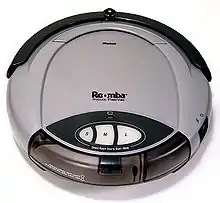

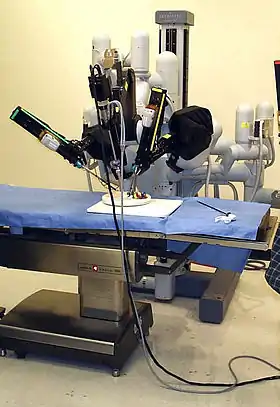
.jpg.webp)
